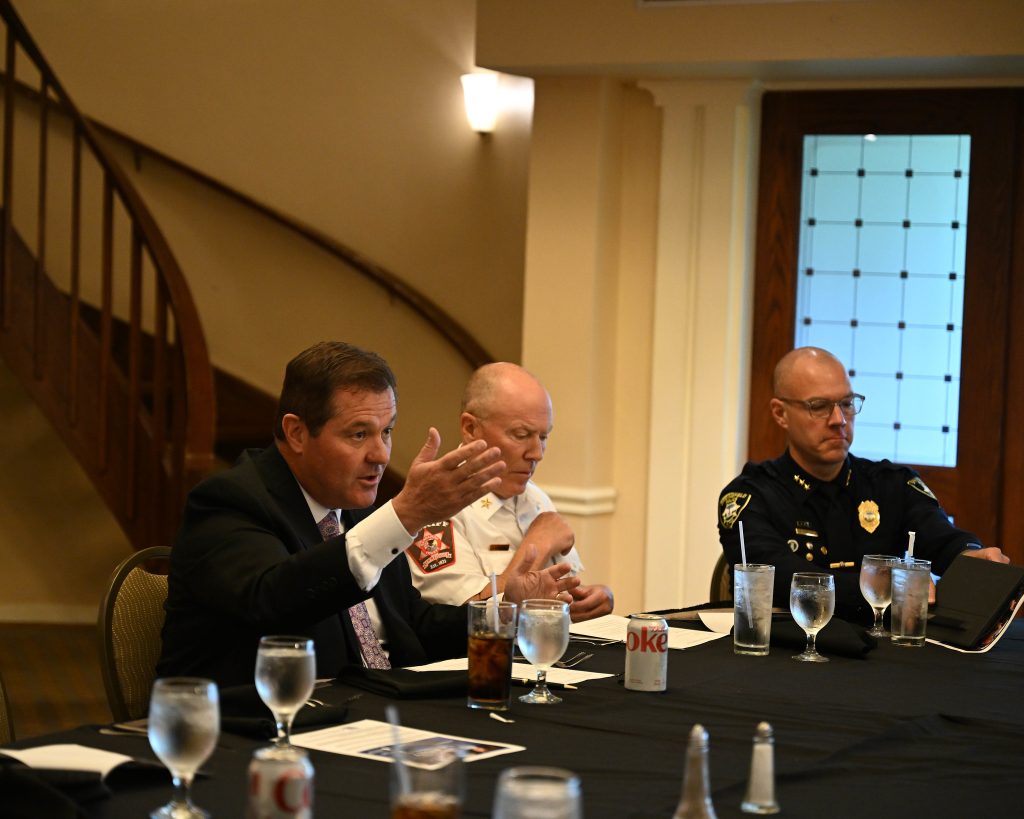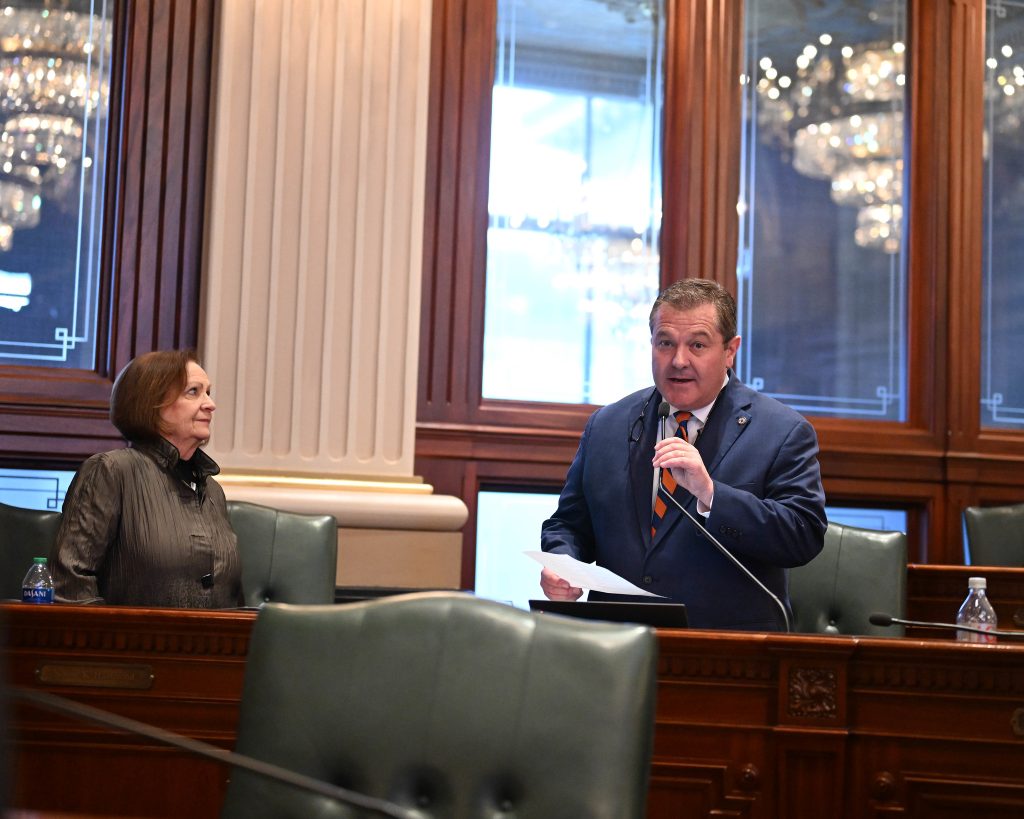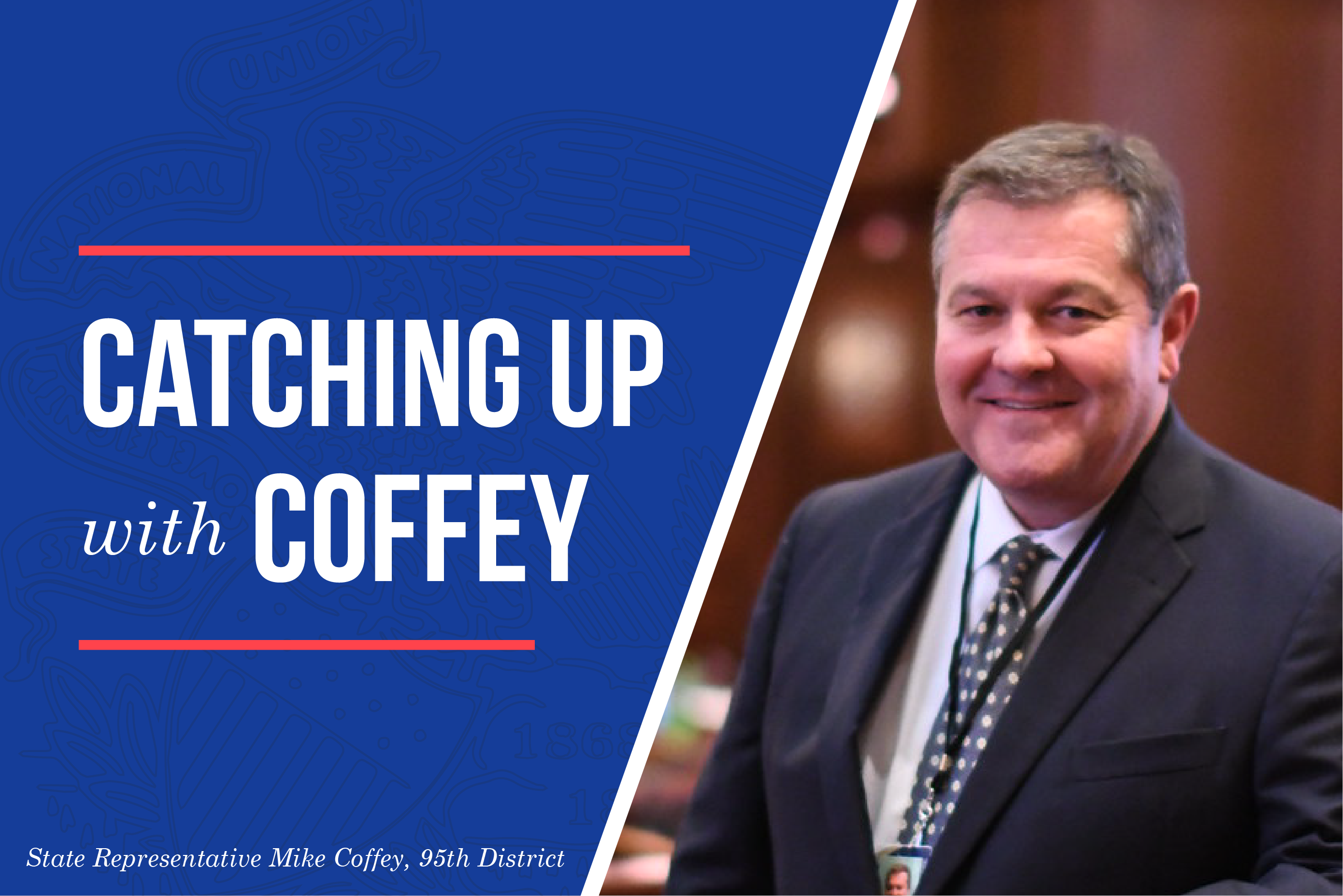PUBLIC SAFETY | JOBS | STATE GOVERNMENT | TAXES
PUBLIC SAFETY
House Republicans make public safety concerns a priority in new legislative package. At a Capitol press conference on Thursday, House Republican State Representatives Patrick Windhorst, John Cabello, David Friess, Dan Ugaste, and Amy Grant laid out a bold legislative package aimed at improving public safety, recruiting and retaining police officers and other law enforcement officials, and providing assistance to victims of violent crime. State Representative Mike Coffey has also been a strong advocate of restoring law and order by allowing our law enforcement to their job.

Every family in the 95th district and throughout our state deserves to feel safe in their homes and in their community. Increasing crime is a very real concern in our region. With the almost-daily news about dangerous crimes affecting everyday citizens in Illinois, we are hearing from local constituents that we need to make real changes in Springfield. – Rep. Coffey
“The Truth in Public Safety working group was formed at the beginning of this General Assembly. We got to work right away to put together a strong and meaningful package of legislative reforms,” said Rep. Windhorst, who leads the TIPS working group. “The bills we are highlighting today will improve public safety, hold criminals accountable, and provide needed support to our police officers and law enforcement.”
Since the inception of the Truth in Public Safety working group in 2023, the group has met with law enforcement groups, retired judges, state’s attorneys, and other stakeholders to develop the legislative package. Last year, many legislators on the Republican side held roundtables with law enforcement officers and prosecutors. Windhorst says the package unveiled in Springfield on Thursday proves that Republican lawmakers took the concerns of law enforcement seriously and crafted legislation to address continuing issues.
“There is a concerning trend we see here in Illinois where criminals are treated better than law-abiding citizens and as leaders, we cannot continue to jeopardize the safety of our communities,” said Rep. Cabello.
“I’m honored to work with my colleagues in the working group as we strive toward a common goal,” said Rep. Friess. “Our communities deserve to be safe, and our law-abiding citizens deserve to feel secure. The legislative package put forth is a crucial step towards achieving these goals.”
The TIPS legislative package focuses on supporting and protecting crime victims, giving judges wider discretion to detain people charged with felonies, and recruiting and retaining law enforcement while ensuring they are able to do their jobs.
Legislation introduced by House Republicans serving on the Truth in Public Safety working group include:
- HB 5120 – Widens the possible detention net to all felonies and also establishes the burden of proof at a detention hearing to preponderance of the evidence.
- HB 5121 – Calls for the revocation of pre-trial release when the defendant is charged with an offense while on release.
- HB 5126 – Restores the process for a court to issue a warrant for a defendant’s failure to appear in court.
- HB 5131 – Sets up a timeline for the Department of Human Services to remove someone from county jail within 20 days if they have been found unfit to stand trial, and requires reimbursement to the county if the person is held past the 20 days. The bill is aimed at providing necessary mental health services to those individuals who have been found mentally unfit to stand trial.
- HB 5133 – Allows for the creation of a county co-responder model to work with social workers to assist victims in need of mental or behavioral health services. The bill would ensure that police officers are responding to emergency calls and that social workers or behavioral health services workers would act as a partner with law enforcement, not a replacement.
Rep. Coffey Hosts Public Safety Roundtable with Local Law Enforcement Officials
JOBS
Illinois’ unemployment rate rose to 4.8% in February. The Illinois Department of Employment Security (IDES) reports that the preliminary Illinois unemployment rate rose from 4.7% in January to 4.8% in February. While nonfarm Illinois payroll numbers rose by 23,100 jobs in February, this increase was overmatched by the entry of “new” jobless people into the labor market. Some of these “net new” workers are persons who left the labor force at earlier points, such as during the COVID-19 pandemic, and are now returning.
As in previous months, Illinois’ job creation was concentrated in the public sector and in non-production-oriented services. The Government sector created 6,700 net new Illinois jobs in February 2024, which the Leisure and Hospitality super-sector was credited with 5,400 net new jobs. By contrast, the Manufacturing sector yielded 700 jobs. After many years of Manufacturing net job losses, less than 10 percent of the 6.1 million current nonfarm Illinois payroll workers are currently working in factories or other manufacturing plants.
The state’s unemployment rate was +0.9 percentage point higher than the national unemployment rate reported for February. The national unemployment rate was 3.9 percent in February, up +0.2 percentage point from the previous month. The Illinois unemployment rate was up +0.5 percentage point from a year ago when it was 4.3 percent.
STATE GOVERNMENT
CGFA monitors rising costs of State employee health benefits. The State Employees’ Group Health Insurance Program provides health insurance coverage for State employees, State retirees, and their families. Healthcare costs are going up faster than most other segments of the U.S. economy. The Commission on Government Forecasting and Accountability (CGFA), the nonpartisan office of economic analytics within the General Assembly, has investigated these trends and published a March 2024 Group Insurance Report.
The CGFA analysts report that the State’s medical cost liabilities, which are ultimately borne by Illinois taxpayers, are expected to continue to grow in Fiscal Year 2025 at a rate much higher than U.S. consumer price index (CPI) inflation. An increase of 16.5% over Fiscal Year 2024 is expected. This rate of increase is primarily attributed not to an increase in the number of persons enrolled in State employee health benefit programs, but to the fast-changing cost picture for best-practice health care. New treatments and medications continue to be added to the mix of care that practitioners are allowed to provide or prescribe.
The impact of these changes is fiscally multiplied by the large number of people in the program. The Department of Central Management Services (CMS) and CGFA report that the Illinois Group Health Insurance Program has an estimated 359,188 participants in FY24. Approximately 40% of the participants, an estimate of 143,625, are State retirees and their dependents. Overall health care challenges mean that health care expenses are going to be concentrated among demographic groups that include retirees and their dependents.
TAXES
MoneyGeek names Illinois the least tax-friendly of the 50 states. The warning label came from a database that indicates that a median Illinois family must pay approximately 13% of its income in State and local taxes. These taxes, which are separate from the federal income taxes that all Americans must also pay, are levies that are controlled by the local governments elected by the taxpayers. In particular, the average Illinois property tax bill of $9,000 per residence drove Illinois to the bottom of the tax-friendliness list. Illinois earned a “F” grade for tax unfriendliness at the bottom of the list. Other “F”-graded states included Connecticut and New Jersey.
Several states adjacent to Illinois earned much higher grades because of lower government spending and comprehensive tax reform efforts. Indiana and Kentucky were graded “C,” and Missouri was graded “B.” Several states with no personal income tax, including fast-growing Florida and high-tech-oriented Washington, earned a coveted “A” grade.
The majority party relies on high taxes to accommodate their overspending and it’s driving state revenue down the drain. If we focus on creating a tax friendly state, more people would reside and do business in Illinois, which would improve our local economies.– Rep. Coffey

